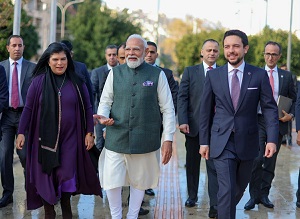'Gov't committed to develop business licensing system'

The Jordan Times
AMMAN — The government is committed to developing the business licensing system as one of its priorities, as investments and new businesses cannot start unless procedures are easy and simple, said Minister of State for Institutional Performance Development Yasera Ghosheh on Monday.
Deputising for Prime Minister Omar Razzaz, Ghosheh delivered her remarks during the two-day Business Licensing Reform Conference, which the government held in Amman on Sunday and Monday as part of its efforts to improve investment and stimulate the economy.
The government has reviewed several regulations with concerned authorities in order to make its decisions, which include cancelling unnecessary licences, Ghosheh said, adding that a detailed review of other licences has been carried out as well.
"This approach manifests the government's commitment to the Economic Growth Plan 2018-2022 and to decreasing regulatory burdens on economic activities and businesses, easing their registration and removing complicated and conflicting procedures," Ghosheh noted.
The government has been working with the World Bank Group on the business licence reform project, evaluating the legislative and organisational entities concerned with issuing business licences and approvals during the past two years, Ghosheh said.
She added that the evaluations were based on best practices in the field, considering the importance of the licence, its legality and the ease of utilising it for business.
"The regulations and special procedures of 65 business sectors in the Kingdom were analysed, comprising 96 per cent of the overall active sectors in Jordan," the minister said, noting that the project offered recommendations to improve licences and their issuance, which boil down to simplifying some licences and cancelling others.
The Prime Ministry's Institutional Performance Development Directorate worked with the World Bank Group to draft the general policies document on reforming the licences system, which the Cabinet approved at the beginning of 2019 on January 16th, Ghosheh said, adding that the document also serves as an official national reference.
The national effort has resulted in various actions, such as the cancellation of the vocational 1953 Crafts and Industries Law, Ghosheh said, noting that the licences for sports centres were also cancelled.
Studying the licences of kindergartens, the foodstuffs sector and private schools is the first step the government is going to take in this field to produce an organised system, the minister said.
She added that the first meeting to study the regulations governing kindergartens was held last month, witnessing the participation of 21 entities from the public and private sectors working together to simplify the measures for issuing licences in the field.
The conference, Ghosheh concluded, will allow Jordan to learn from Arab and international expertise in the field to boost national efforts and “make the necessary bold decisions”.
Walid Labadi, country manager for the International Finance Corporation (IFC), said in his remarks at the conference that "the changes adopted by this country in recent years have played a key role in making Jordan's business environment more competitive".
"Jordan's commitment to reform was reflected this year in the World Bank’s annual Doing Business report. The country was among the top ten reformers globally and implemented three major reforms," Labadi said, noting that these include boosting access to credit, adopting new secure transactions, amending the insolvency laws and launching a modern collateral registry.
"A sound licensing system plays a critical role in creating a regulatory environment that is conducive to doing business, creating jobs and sparking investment," Labadi said.
Jordanian Businessmen Association President Hamdi Tabbaa highlighted the role of the conference in developing business in the Kingdom.
"As the president of the association and a representative of twelve economic sectors, I stress the importance of cooperation between the public and private sectors, as true partnership will boost the economy by creating jobs and meeting the sustainable development goals," Tabaa said.
The conference hosts sessions on the private and public sectors' roles in the licensing system, the investment environment and the Greater Amman Municipality's experience in the field, in addition to showcasing the experiences of Arab countries in regulatory reform and licensing, according to organisers.
Latest News
-
 Defective used gas Heaters behind recent suffocation deaths — probe
Defective used gas Heaters behind recent suffocation deaths — probe
-
 Trump imposes full travel bans on seven more countries, Palestinians
Trump imposes full travel bans on seven more countries, Palestinians
-
 King, India PM attend opening session of India-Jordan Business Forum
King, India PM attend opening session of India-Jordan Business Forum
-
 Crown Prince accompanies India PM on visit to Jordan Museum
Crown Prince accompanies India PM on visit to Jordan Museum
-
 Jordan beat Saudi Arabia to reach Arab Cup final
Jordan beat Saudi Arabia to reach Arab Cup final